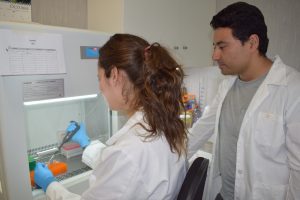UPLA and IFOP link research for fisheries management in Chile
December 15th, 2019
Specialists from both institutions propose highly technological programs applicable to monitoring marine ecosystems.
With state-of-the-art technology, the Universitdad de Playa Ancha generates research and proposes applied tools aimed at impacting relevant areas such as fisheries management and biodiversity in Chile.
By means of last generation sequencing techniques it is possible to detect the DNA footprint that organisms leave in the environment, opening a great opportunity for fisheries management, species identification on which there is little knowledge, detection of other extinct species, as well as invading organisms, pests or plagues recognition in various ecosystems.
This was stated by UPLA Disciplinary Department of Biology academic, Dr. Claudio Quezada, at the Fisheries Development Institute, where he explained Environmental DNA technique and realized its potential applications in marine environments for fisheries management and monitoring in the country.
“All living organisms leave DNA traces in the environment and through sophisticated latest generation techniques and sequencing, it is possible to detect this environmental evidence. Through genetic techniques it can detect the species identity in an aquatic community and their composition, that is, what is the proportion of species found in the environment. With this technique it is also possible to complement certain fisheries management such as hake, anchovy, tuna and other important economic resources for the country. Our research group has the capabilities to monitor where on our coasts these fisheries are, such as the reineta, hake, swordfish, among others, ”said Dr. Quezada.
On the occasion, the academic said that Environmental DNA also allows locating the presence of benthic resources such as locust or other mollusks. “We can know certain fish populations dynamics , molluscs or other groups that are subject to conservation such as cetaceans. It is possible to identify where certain populations are moving or where they are concentrated. Having this information makes possible to generate appropriate management strategies and, therefore, make better use of the resources that make the populations sustainable and ultimately impact the economy. ”
UPLA researcher applies this technique in Fondecyt Initiation 2018 project, whereby he takes samples of sediment witnesses at the bottom of Lake Chungará to determine DNA present there, with the aim of recording the colonization process of rainbow trout and Its impact on native species.
Meanwhile, Dr. Patricia Zárate, a researcher at IFOP Oceanography and Environment Department, said that “as researchers and advisors we are always in search of innovative and accessible techniques to improve our knowledge and propose recommendations for resource management and marine ecosystems . This technique has a high potential and application for marine biodiversity study , given its sensitivity to detect individual molecules allows to identify species in places that we cannot easily access. With just a sample of water we could confirm key species presence in marine ecosystem, so it is very useful to understand trophic plots and the relationship between species and their ecosystem, both commercial and threats ”.
News ad photography : Upla /IFOP
